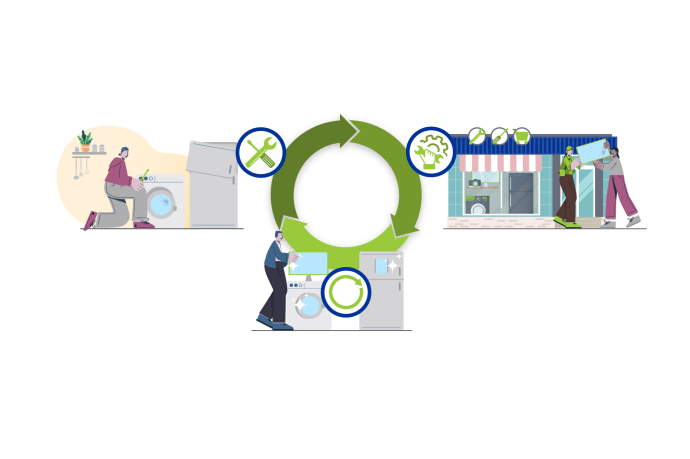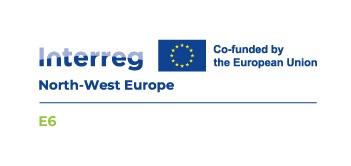E6
Ecosystems for Extended-lifetime of End-of-Use Electrical and Electronic Equipment
Europe is facing a major challenge: the volume of e-waste or waste electrical and electronic equipment (WEEE) is increasing noticeably. To extend the lifespan of these devices, a systemic and sustainable (behavioural) change is needed. Within the E6 project, short for 'Ecosystems for Extended-lifetime of End-of-use Electric and Electronic Equipment', 19 partners from 6 European countries are taking up the challenge, with a budget of EUR 8,150,000.
Objectives
With the E6 Interreg project, we want to support the transition to and the impact on a circular economy. By setting up local collaborations, we want to extend the lifespan of electrical and electronic devices.
- How can we change the standard in consumer electronics? 'Recover' should be our first reflex. At the moment, that is still too often 'buying'.
- How can we ensure that we use electrical and electronic devices for as long as possible? We do this by encouraging longer use, reuse, repair and refurbishment (RRR).
- How do you assess the technical, functional and economic value of a waste electrical appliance?
These are some of the questions that the project partners are trying to answer on both a scientific and practical level. For example, they will develop business models and data platforms, but also help improve collection and develop awareness campaigns.
If a product lasts longer, it's better for the environment and for future generations!

Expected results
We want to build powerful ecosystems that help to wake up citizens and get them to repair, reuse, share or use longer. We expect the E6 project to have an impact on three levels:
1) We want to ensure the dissemination of knowledge through open source publications of results and innovative tools and methods to the different target groups.
2) We ensure an evaluation and further development of existing – and new – regional circular ecosystems through the integration of service centres at European level and business models around RRR (Repair, Reuse, Refurbishment);
3) We strive for knowledge dissemination and training on circular models in European regions. We will integrate these models into the waste streams of electronic and electrical devices. They will thus become a structural factor within the European strategy. By encouraging politicians and producers to take measures to ensure that products are designed sustainably and used for longer, we influence policy.
Kick off
Discover how E6 was officially launched in Leuven, Belgium (03/04/2024).
Project partners
Within this Interreg North West Europe project, Thomas More is a cooperation partner, responsible for work package 1. We are doing this under the leadership of Saxion University of Applied Sciences, the leader of the project.
In the E6 project, 19 organisations from all over Northwest Europe are working together. These include municipalities, universities and research institutes from the Netherlands, Germany, Belgium, Ireland and France.
- Aachener Stadtbetrieb
- Circulus
- Comhairle Ceantar na nOileán CTR
- Foenix Kringloop en Re-integratie
- Gemeente Apeldoorn
- Gemeente Den Haag
- Syndicat Mixte Ouvert Nièvre numérique
- European Regions Network for the Application of Communications Technology
- Institut für Betriebsführung im deutschen Handwerksinstitut e.V.
- Maakbaar Leuven vzw
- Nevers Agglomération
- Volkswirtschaftliches Institut für Mittelstand und Handwerk an der Universität Göttingen e.V.
- Údarás na Gaeltachta
- Repair&Share vzw
- Saxion University of Applied Sciences
- Stadt Aachen
- Vlaams instituut voor technologisch onderzoek
- Vzw ViTeS

The research team
Marijke Brants
Marijke has been coordinator for the research lines 'data-driven entrepreneurship' and 'sustainable growth' since 2020. Her expertise lies in user and business research in data projects and co-creation processes within the circular economy.
Karen Feyen
Currently, Karen works as a researcher and coordinator of the research line on applied AI at the Thomas More. Her interests include applications of technology in the fields of energy efficiency, circular economy and healthcare.
Winnie Himpe
Winnie is burgerlijk ingenieur nanotechnologie en deed al ervaring op als applicatie-ingenieur in de vermogen-elektronica. Zij ontwikkelde ook controle-algoritmen voor onderzoekstoepassingen binnen de energietransitie.
Jolien Roedolf
Jolien is sinds 2023 onderzoeker bij het expertisecentrum Duurzaam Ondernemen en Digitale Innovatie. Zij is gepassioneerd door circulaire economie, is projectleider van INFINITEX en zal ook praktisch onderzoek doen rond circulaire businessmodellen.
Daiane Seibert
Daiane holds a master's degree in mathematics and in artificial intelligence. Her research focuses on the practical application of AI to socially relevant issues.
Jelle Van Camp
Jelle supports several research projects in the technical and financial feasibility of innovations, with a focus on ROI and new revenue models. He is also interested in sustainability and circularity in particular.
Hanne Vanmarsenille
Binnen de onderzoekslijn Circulair ondernemen is Hanne als onderzoeker verbonden bij het E6 project. Haar focus ligt op het opzetten van lokale samenwerkingen voor het verlengen van de levensduur van elektrische en elektronische apparaten.
fdgsfd

